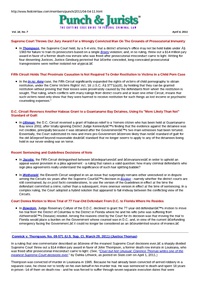In a facial challenge by attorneys, journalists, and labor, legal, media, and human rights organizations to the constitutionality of Section 702 of the Foreign Intelligence Surveillance Act of 1978, dismissal by district court for lack of standing is reversed where appellants have standing because of a reasonable fear of …
This is an interesting decision principally because it notes and documents that, six years after the Supreme Court’s seminal sentencing decision in U.S. v. Booker, 543 U.S. 220 (2005), the Circuit Courts are still split on a relatively simple but significant question of sentencing law - namely, whether Federal …
As we have frequently noted, demands for huge restitution awards from victims of child pornography have become an integral byproduct of the explosive growth of child pornography prosecutions in the United States.
One reason for that surge of restitution claims is that Congress enacted both (a) the Mandatory Restitution …
In a ruling that one commentator described as “one of the meanest Supreme Court decisions ever,” a sharply divided Supreme Court threw out a $14 million jury award in favor of John Thompson, a former death row inmate in Louisiana, who was freed after prosecutorial misconduct came to light. …
[Editor's Note: For a commentary on this decision, see "Eleventh Circuit distinguishes downloaders from producers in affirming kiddie porn stat max sentence," by Prof. Doug Berman, as posted on Sentencing Law and Policy on March 16, 2011 at
http://sentencing.typepad.com/sentencing_law_and_policy/2011/03/eleventh-circuit-distinguishes-downloaders-from-producers-in-affirming-kiddie-porn-stat-max-sentence.html ].
In this case, Marcus Eugene Jacobs pled guilty to one count of possessing stolen mail in violation of 18 U.S.C. § 1708. In his signed plea agreement, Jacobs generally waived his right to appeal his sentence but preserved his right to appeal an upward departure from the Sentencing Guidelines …
The Defendant in this case pled guilty to one count of possession of child pornography, and, after his objection to restitution was overruled, he was ordered to pay $529,661.00 in restitution to “Amy,” one of the children portrayed in some of the images that he possessed. The Defendant then …
Here the Court reversed a grant of habeas relief to a Yemeni citizen who has been held at Guantanamo since 2002, by applying its new and more pro-Government “more likely than not” standard of guilt for the old “proof beyond reasonable doubt” standard.
In Abdah v. Obama, 708 …
Thomas Bowdoin, Jr., a 77 year-old resident of Florida, was indicted by a Grand Jury in the District of Columbia on a number of charges arising out of an alleged Ponzi scheme that Bowdoin operated, including charges of wire fraud, securities fraud, and the unlawful sale of unregistered securities.
…
